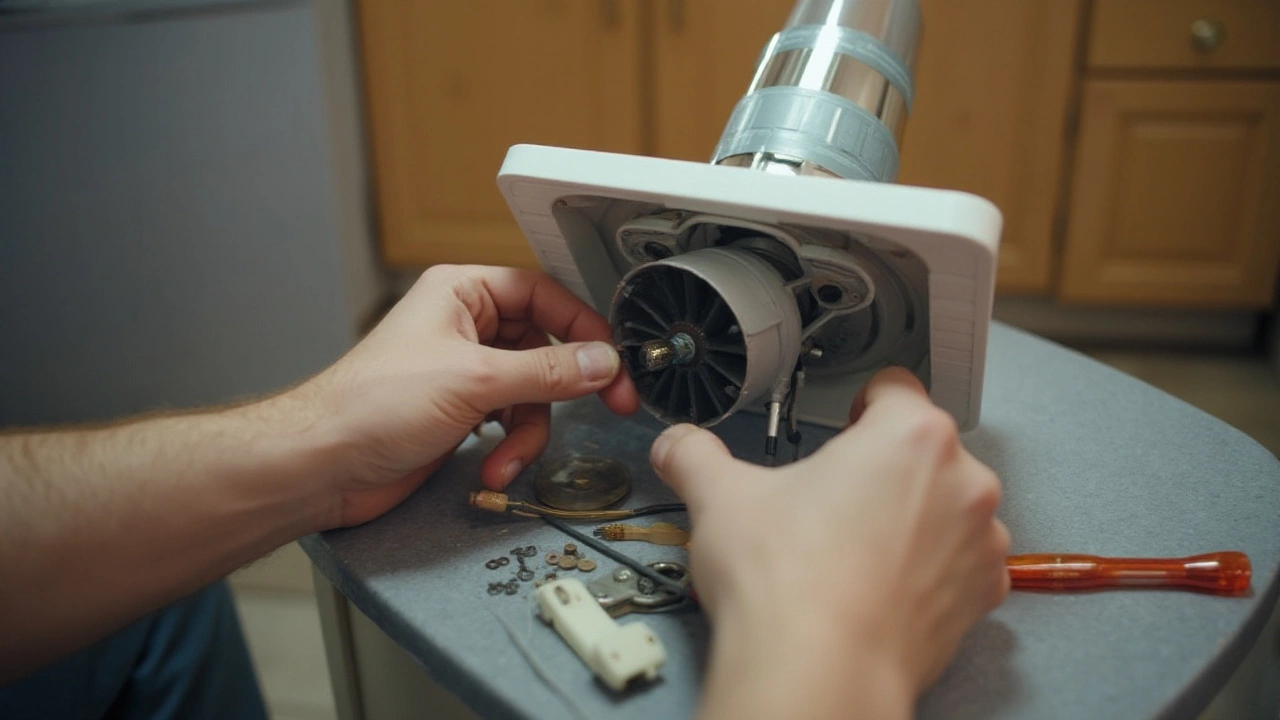Extractor fans play a vital role in maintaining the indoor air quality of our homes, often working tirelessly in our kitchens and bathrooms to expel humidity and odors. These fans aren't indestructible, though, and when they start acting up, it's critical to understand who to call for a fix. Sure, you might consider an electrician, but is that the right path?
Whether it's a strange noise, complete stoppage, or a fan that just doesn't seem to clear the air like it used to, these issues can become more than just an inconvenience. Knowing the ins and outs of your extractor fan can help in identifying what might be going wrong and how electricians can come into play to solve these problems efficiently.
- Understanding Extractor Fans
- Common Issues with Extractor Fans
- When to Call an Electrician
- Maintenance Tips and DIY Troubleshooting
Understanding Extractor Fans
Extractor fans are critical components in modern homes, primarily designed to manage and improve indoor air quality by removing moisture, smoke, and odors. Typically found in kitchens and bathrooms, these units work by drawing air from inside a room and expelling it outside or through a ventilation system. In doing so, they help prevent the buildup of humidity which, if left unchecked, can lead to mold growth and structural damage over time. Understanding how these fans function can demystify their operation and mark the difference between merely tolerating their failures and efficiently managing repairs.
To comprehend their significance, it's essential to recognize the typical setup of an extractor fan. These devices generally consist of a motor-driven fan enclosed in a protective casing. Air is sucked in through a grille, passes over the motor, and is ejected outside. Modern extractor fans might include additional features like humidity sensors or automatic timers, which can intelligently manage their operation based on the air quality conditions. The design of the fan blades, its motor capacity, and even the size of the vent can dramatically affect performance, making them key factors when diagnosing trouble.
"Extractor fans are not just luxuries, but essentials in maintaining a healthy living environment," remarks home improvement expert Mia Brand. "They’re the silent workers that, when absent or malfunctioning, are noticed immediately."
In a typical kitchen environment, a fan often comes integrated into a range hood, designed to capture grease, smoke, and steam from the cooking surface below. Bathroom fans, conversely, target excess moisture generated from showers and baths. These distinctions are crucial as they guide repair and maintenance practices. Understanding what your fan is meant to do will directly impact how you approach issues and even influence whether calling an electrician is the best move when something goes awry.
Energy efficiency is another aspect worth discussing. Today’s extractor fans are designed with efficiency in mind. Many newer models boast low energy consumption rates without sacrificing performance, highlighting the importance of selecting the right fan for your needs. Electricians who specialize in home maintenance and repairs often recommend periodic checks to ensure that these systems are functioning optimally and not drawing more power than necessary, which could signify some underlying problem.
The variety of extractor fans available means there’s no one-size-fits-all solution. Choices range from basic models to advanced systems with smart connectivity, allowing users to adjust settings remotely. This modern evolution of extractor fans adds a new dimension to their utility and complexity. Nevertheless, regardless of technological sophistication, all these systems share a common goal: maintaining indoor air quality, which is an aspect of health that can’t be overlooked. While it's fascinating to see how recent models have evolved, the core functionality remains dedicated to ensuring that the air in our living spaces stays clean and comfortable.

Common Issues with Extractor Fans
Extractor fans, while often reliable, can encounter a variety of issues over their lifespan. One of the most common problems that homeowners encounter is reduced suction power. This can occur due to a build-up of dust and grease that clogs the fan blades and obstructs airflow. Regular cleaning can mitigate this problem, but neglect can lead to a noticeable decrease in performance, often making an extractor fan far less effective at clearing steam and odors. There’s also the issue of the motor wearing out. Frequent use can result in motor fatigue, which causes the fan to either run less efficiently or stop working entirely.
Sometimes, extractor fans start producing strange, unsettling noises. This could be due to loose parts, an imbalanced fan blade, or something as simple as a foreign object caught in the mechanism. These odd noises often serve as an early warning sign that something is amiss. Identifying and fixing the source of the noise can prevent more severe and costly damage. Vibrations can also play a role, not just in annoying noise but in loosening the fan mounts, which might risk the fan detaching from its fitted position.
Electrical faults are also a significant concern. Given that extractor fans are electrical appliances, they are susceptible to wiring issues, blown fuses, or even problems with the switch. It's during these instances of electrical faults that an electrician may be most useful, given their expertise with household wiring and their ability to safely navigate the complexities of electricity. As such, identifying symptoms of electrical issues early can prevent more extensive damage down the line.
A peculiar, but quite common problem, is when fans accumulate humidity themselves. This occurs when fans aren't adequately installed or are underpowered for the space they are meant to ventilate. If too small a fan is chosen for a large bathroom, for example, it might end up adding to the humidity rather than reducing it. This improper sizing leads to the formation of mold or mildew in the ductwork, further exacerbating the moisture issues it's meant to prevent.
According to the Home Ventilation Institute, "Proper installation and maintenance of extractor fans can significantly extend their lifespan and function." This emphasizes the importance of not only choosing the right fan but also ensuring it's correctly installed, preferably by professionals.
Besides these issues, integrative features like timers and humidity sensors—common in many modern extractor fans—pose their own challenges. These components can fail independently from the fan's primary function, making it seem like the entire system is malfunctioning when it's just a part of it. Such features, while improving convenience and efficiency, add layers of complexity to troubleshooting and repair. Anomalies in the way these features operate can often be addressed by consulting manuals or seeking professional help.

When to Call an Electrician
Understanding when it's time to bring in an electrician to fix your extractor fan can make a significant difference in not only time spent troubleshooting but also the potential for costly replacements. Electricians are trained to handle electrical issues safely, so it's crucial to identify scenarios where their expertise becomes indispensable. Firstly, consider calling an electrician if the fan simply will not turn on. If you've checked that the circuit breaker hasn't tripped and ensured the power outlet is working, it might be an internal issue with the fan's wiring. Electricians are skilled at diagnosing these sorts of electrical hitches. They can quickly pinpoint whether it's a faulty switch, wiring problem, or another deeper issue.
Another indication that a professional needs to step in is when the extractor fan experiences intermittent functionality. This could suggest a loose connection within the circuitry. Attempting a DIY fix on such complicated matters might not only exacerbate the problem but also pose safety hazards. According to industry professionals, loose wires can result in sudden power surges, overheating, or unexpected fan operation, which can all translate into larger electrical faults if neglected. Moreover, consider the unpleasant start of smoke or burning smells emitting from your extractor fan. This alarming sign not only necessitates an immediate fan shut-off but also a swift call to an electrician, as it can indicate severe issues like overheating circuits or even electrical shorts. These are not issues to be taken lightly, as they can escalate into fire hazards.
Complex Installation Issues
If you're faced with needing a more complex fix, such as a complete removal and re-installation, an electrician is undeniably the best choice. This is particularly pertinent if the new fan has different specifications that older wiring doesn't support. An electrician can efficiently modify your wiring setup to match the specifications of modern, energy-efficient fans, ensuring you're not just fixing a problem, but also future-proofing your home's ventilation system. Using someone inexperienced might result in incorrect fittings, which could mean a functioning fan that isn't up to legal or safety standards.
"Having an electrician take a comprehensive look at your fan system can prevent potential hazards," says Linda Milton, an experienced electrician who has handled hundreds of extractor fan cases.
Additionally, many regions require that any kind of significant electrical work be signed off by a certified professional. This is a legal requirement designed to maintain the safety standards of household electrics. Attempting to do the work oneself without certification might not only void warranties but also potentially breach building regulations. A professional electrician can certify that the work is up-to-date and compliant with safety standards.

Maintenance Tips and DIY Troubleshooting
Keeping your extractor fan in top shape doesn't need to be a daunting task. With just a little time and effort, you can ensure that your fan works efficiently and lasts for years. The secret lies in regular maintenance and being able to identify small problems before they turn into major issues. Start by making it a habit to clean your fan's vents and blades every few months. Dust and grease can accumulate surprisingly quickly, which can severely affect the fan’s performance. A simple vacuum cleaner with a nozzle attachment is often all you need to suck the debris off the grills and blades.
In addition to cleaning, it's important to routinely check the fan's mounting. Fans can become loose over time due to vibrations from normal operation. A loose fan will not only be less effective but can also cause more noise, which can be quite annoying. Make sure all screws and fasteners are tightly secured. For kitchen extractor fans, consider installing a grease filter if one isn't present. These filters are brilliant at catching residue that might otherwise gum up the fan's inner workings, making them a worthwhile investment. Remember, prevention is always better than cure.
Now, onto troubleshooting. If your extractor fan refuses to start, the first thing to check is the power supply. Test the outlet with another appliance to confirm it's supplying power. If power isn't the issue, a blown fuse or tripped circuit breaker might be the culprit. Adjust these as necessary, but if you're uncomfortable working with electrical components, it's wise to contact a professional. For fans making unusual noises, examine for any foreign objects stuck inside. Additionally, lubricate any squeaky or stiff moving parts with a light application of machine oil. It's remarkable how a little oil can silence years of wear and tear.
Sometimes, despite all efforts, certain issues persist. According to a survey by the Home Builders Institute, 35% of homes report extractor fan malfunctions annually, with many easily fixable at home. But for complex electrical problems, don’t hesitate to call in an electrician. As renowned electrical expert Mike Holmes once said,
"When in doubt, bring in the pros. It's better safe than sorry, especially when it comes to electricity."This sage advice holds true, particularly when you're dealing with the electrical components of a home maintenance repair like this.
In summary, with some routine care and attention, you can keep your extractor fan running smoothly. Whether it's regular cleaning, securing loose mounts, or simply listening for signs of trouble, these small actions make a significant difference in maintaining system efficiency. Remember, a well-maintained fan means cleaner, healthier air, and there's no price too high for your home's air quality. Happy maintenance!


